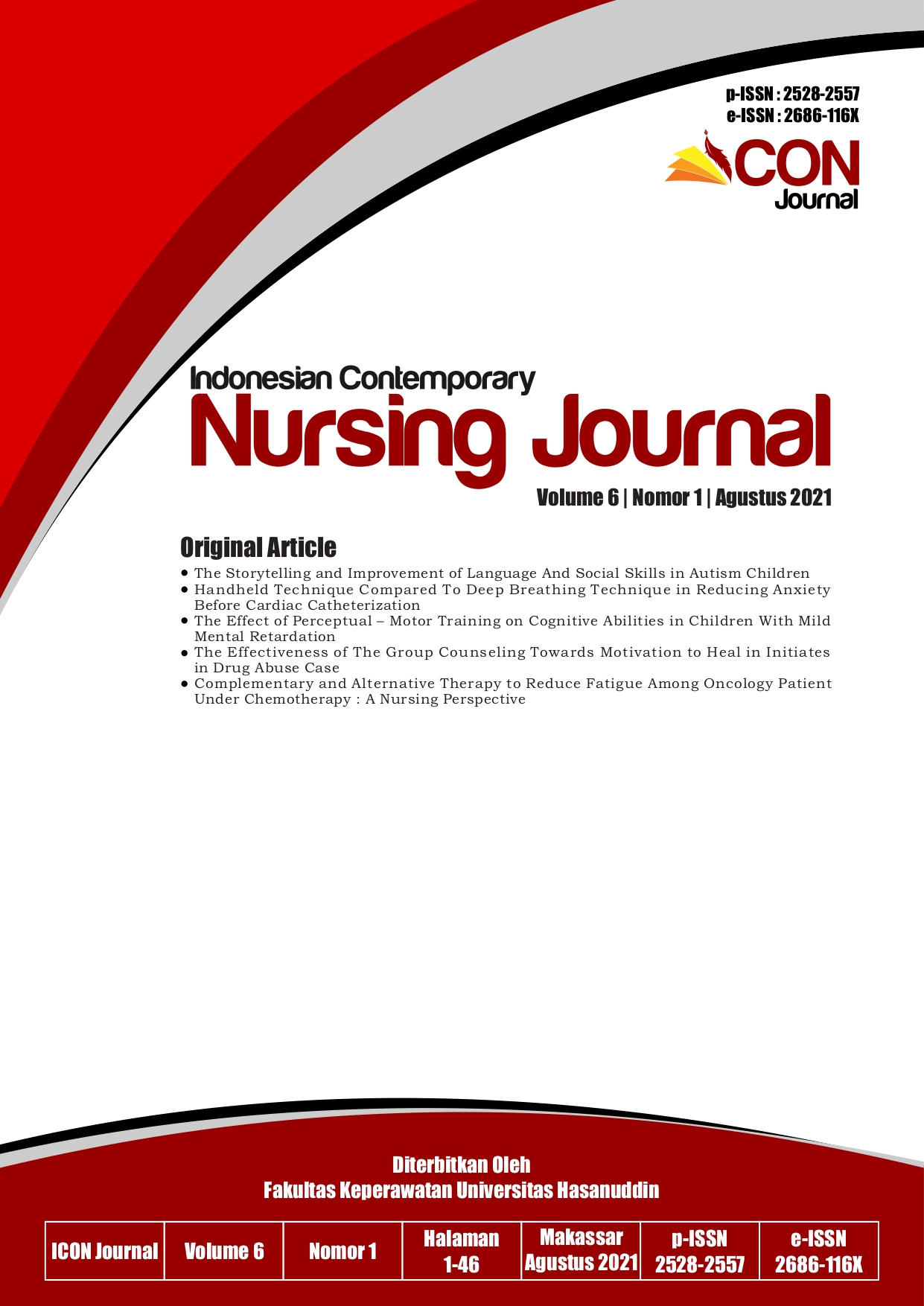The Storytelling and Improvement of Language and Social Skills in Autism Children
DOI:
https://doi.org/10.20956/icon.v6i1.11357Keywords:
Autism, Language Skills, Social Interaction, Storytelling TherapyAbstract
Introduction: In Indonesia, the number of children who suffer from autism identified around 6,900 children in every year. The autism characterised by a communication disorder due to the delay in speech, that affect the children were incomprehensible of language skill and also interference with interaction. Stimulation is an important therapy in order to maximize all the potential skills of the children. A form of stimulation which possibly applies is a story telling therapy, that therapy is given in an early age. This study aims to describe the level of language and social interaction skills among children with autis who were attending a story telling stimulation therapy class in the center of therapy Pelita Mandiri Makassar. Method: This study applied descriptive analytic research design with a cross sectional approach. There were 30 children with autis recruited in this study. Results: The results of this study shows that children who attend story telling stimulation therapy class have signifincantly improvement in both language and social interaction skills particularly in 21.9% of participants. The children who able to speak with their own language and understood by others (76.7%), children who was able to mention the sounds (70%). Conclusion: Story telling stimulation therapy program has potential benefit on language and social interaction skills improvement in children with autism.
References
Ahmawati, S. (2017). Pengaruh religiusitas terhadap penerimaan diri orangtua anak autis di Sekolah Luar Biasa xyz. jurnal AL-AZHAR Indensesia seri humanora, 4, 17-24. Retrieved from http://jurnal.uai.ac.id/index.php/SH/ar ticle/view/248
Ardhiyanti, P. (2017). Metode bercerita bermedia pop-up book terhadap kemampuan komunikasi anak autis pada sekolah anak berkebutuhan khusus. Jurnal Pendidikan Khusus, 13-14. Retrieved from http://jurnalmahasiswa.unesa.ac.id/ind ex.php/jurnal-pendidikan- khusus/article/view/25154
Azkiya, N. R., & Iswinarti. (2016). Pengaruh mendengarkan dongeng terhadap kemampuan bahasa pada anak prasekolah. Malang. Retreived from http://eprints.umm.ac.id/34262/
Bahiya, K., Yusuf, A., & Kusmawati, S. (2017). Metode applied behaviour analyze meningkatkan interaksi sosial anak autis usia 2-5 tahun. Jurnal Ners, 3, 37-41. Retrieved from https://e- journal.unair.ac.id/JNERS/article/view/ 4978/3220
Bandung, D. A., Seniwati, T., & Nurfadhilah, N. (2017). Mother ’ S Perception of Social Skills of Children With Autism in the Special. I Ndonesian Contemporary Nursing Journal, 1(2), 118-128.
Bektiningsih, K. (2014). Program terapi anak autis di SLB Negeri Semarang. Jurnal Pendidikan, 39, 95-110. Retrieved from https://journal.uny.ac.id/index.php/jk/ article/view/96/87
Christensen, Baio, & Braun, V. N. (2016). Prevalence and characteristics of autism spectrum disorder among children aged 8 years. Retrieved from http://www.cdc.gov/mmwr/volumes/
/ss/ss6503a1.htm
Hanum, F., Mutdasir, & Yusuf, R. (2016). Terapi visual terhadap perkembangan
bahasa reseptif dan ekspresif pada anak autis. Jurnal Ilmu Keperawatan, 2, 98. Retrieved from
http://www.jurnal.unsyiah.ac.id/JIK/art icle/view/5291/4434
Hardiani, R. S., & Rahmawati, S. (2011). Metode ABA (Applied Behaviour Analysis) : Kemampuan Bersosialisasi terhadap Kemampuan Interaksi Sosial Anak Autis. Jurnal Keperawatan Soedirman, 7(1), 1–9. https://doi.org/10.20884/1.JKS.2012.7. 1.336
Henricsson, O., & Claesson, S. (2019). Everyday Storytelling as Teaching: Indian Teachers' Experiences of Telling Stories in Teaching. Storytelling, Self, Society, 15(2), 246-269.
Kemal, I., & Huda, N. (2014). Peningkatan Kemampuan Berbicara Anak Melalui Mendongeng Pada Kelompok B di TK Al- Ikhlas Lamlhom Kecamatan Lhoknga Aceh Besar. Jurnal Buah Hati, 1(2), 51– 85. https://doi.org/10.46244/BUAHHATI.V1 I2.527
Khasinah, S. (2017). Interaksi ekstratekstual dalam proses bercerita kepada anak usia dini. International journal of child and gender studies, 1, 99-110. Retreived from http://www.jurnal.ar- raniry.ac.id/index.php/equality/article/v iew/782/612
Kosegaran, H. B., Ismanto, A. Y., & Babakal, A. (2013, Agustus). Hubungan tingkat pengetahuan orang tua tentang stimulasi dini dengan perkembangan anak usia 4-5 tahun di Desa Ranoketang Atas. ejournal keperawatan (e-Kp) , 1, 1-8. Retrieved from https://ejournal.unsrat.ac.id/index.php/jkp/article/view/2187
Minropa, A. (2014). Faktor-faktor yang mempengaruhi kemajuan terapi anak autis di kota padang tahun 2013. Tesis: Fakultas Kedokteran Andalas. Retrieved from http://repository.unand.ac.id/21573/
Naomi, S., Verauli, R., & Agustina. (2017). Pengaruh Mendongeng terhadap Kemampuan Adaptif Anak Keterbelakangan Mental. Jurnal Pendidikan Dasar, 9, 84-92 . Retrieved from http://ejournal.upi.edu/index.php/eduh umaniora/article/view/703
Nelson, C., McDonnell, A. P., Johnston, S. S., Crompton, A., & Nelson, A. R. (2007). Key to play: A strategy to increase the social interaction of young children with autism and their typically developing peers. Education and Training in Developmental Disabilities, 42(2), 165-181. Retrieved from http://daddcec.org/portals/0/cec/autism_disabilities/research/publications/ed ucation_training_development_disabilitie s/2007v42_journals/etdd_200706v 42n2p165-181_keys_ play_a_strategy_increase_ social_interactions_young_children.pdf
Nengah, S., Ngurah, M., & Nyoman, J. (2014). Pengaruh pembelajaran dengan teknik bercerita dongeng terhadap kemampuan berbahasa dan motivasi anak kelompok B TK dewi kunti II dalung. Jurnal Pendidikan Dasar Indonesia, 8-10. Retrieved from http://119.252.161.254/e- journal/index.php/jurnal_pendas/article/view/1469
Stone, W., Lisa, R., Hepburn, S., Coonrod, E., Burnette, C., Pennington, M., & Brigham, N. B. (2010). TRIAD Social Skills Assessment.
Xing Jiun, C., Marzuki Wan Jaafar, W., & Mazlina Ghazali, N. (2016). The Relationship between Parenting Stress and Perceived Children’s Social Problem Behavior among Chinese Working Mothers. International Journal of Social Science and Humanity, 6(3), 157–164. https://doi.org/10.7763/IJSSH.2016.V6.637
Yeo, K. J., & Teng, K. Y. (2015). Social Skills Deficits in Autism: A Study among Students with Austim Spectrum Disorder in Inclusive Classrooms. Universal Journal of Educational Research, 3(12), 1001–1007.
Downloads
Published
How to Cite
Issue
Section
License
Authors who publish with this journal agree to the following terms:Authors retain copyright and grant the journal right of first publication with the work simultaneously licensed under a Creative Commons Attribution License that allows others to share the work with an acknowledgement of the work's authorship and initial publication in this journal.
Authors are able to enter into separate, additional contractual arrangements for the non-exclusive distribution of the journal's published version of the work (e.g., post it to an institutional repository or publish it in a book), with an acknowledgement of its initial publication in this journal.
Authors are permitted and encouraged to post their work online (e.g., in institutional repositories or on their website) prior to and during the submission process, as it can lead to productive exchanges, as well as earlier and greater citation of published work (See The Effect of Open Access).
Accepted 2021-07-30
Published 2021-08-31



